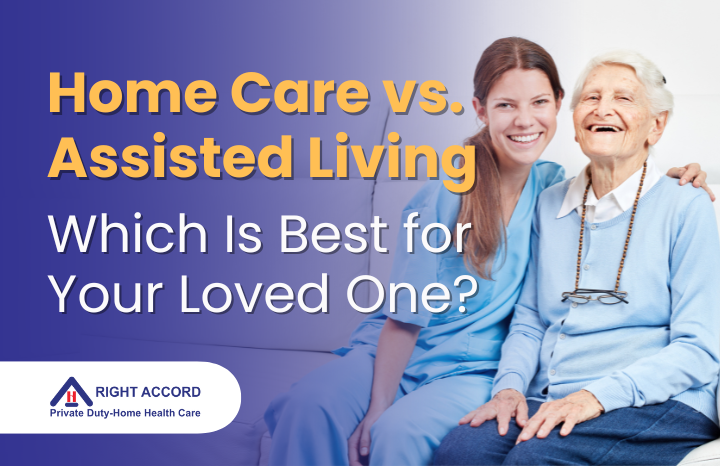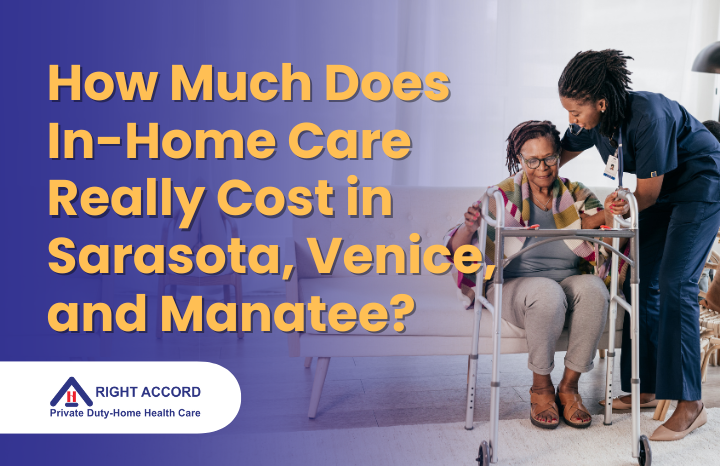· 5 min read
Home Care vs. Assisted Living: Which Is Best for Your Loved One?
Explore the key differences between home care and assisted living to determine the best option for your loved one. RIGHT ACCORD offers personalized home care services in Sarasota, Venice, Manatee and Counties.

By: Rosemarie Tamunday Casanova — RN, BSN, MHA
Is Home Care the Right Choice or Should I Consider Assisted Living?
If you’re caring for an aging loved one, there may come a time when you start asking yourself:
“Do we bring help into the home, or is it time to move to an assisted living facility?”
It’s not an easy question. Both options have benefits, challenges, and emotional considerations. The right decision depends on your loved one’s needs, preferences, health, and your family’s circumstances.
In this guide, we’ll explore the differences between home care and assisted living so you can make an informed choice — without the pressure of a sales pitch.
Understanding Home Care
Home care is when professional caregivers provide support in your loved one’s own home. Services can range from a few hours a week to daily visits, and may include:
- Personal care (bathing, dressing, grooming)
- Help with meals, housekeeping, and errands
- Companionship and emotional support
- Medication reminders
- Transportation to appointments
Who it’s best for:
- Seniors who want to age in place
- Those who need help with daily activities but not full-time medical care
- People who feel safest and happiest at home
- Families who want flexibility in scheduling and services
Key benefits of home care:
- Comfort and familiarity of home
- Personalized, one-on-one attention
- Flexible hours that adjust as needs change
- No need to uproot routines or leave pets behind
Understanding Assisted Living
Assisted living is a residential community for older adults who need help with daily activities but still want a level of independence. Services usually include:
- Private or semi-private apartments or rooms
- Meals provided in a communal dining area
- Assistance with personal care
- Scheduled activities and social opportunities
- On-site staff for emergencies
Who it’s best for:
- Seniors who want a social environment and organized activities
- People who may be isolated at home and want more interaction
- Those who need consistent support available throughout the day
Key benefits of assisted living:
- Built-in social community
- Amenities like dining rooms, fitness areas, and activity spaces
- 24/7 staff availability for assistance
- Structured daily routines
Cost Considerations
Cost is often a deciding factor — and it can vary greatly depending on location, services, and level of care.
Average monthly cost in Florida:
- Home Care (part-time): $1,500 – $3,500+ depending on hours needed
- Home Care (full days): $4,500 – $7,000+ per month
- Assisted Living: $4,500 – $6,500+ per month (room, board, and services)
Things to remember:
- Home care costs are flexible — you only pay for the hours you need.
- Assisted living costs are fixed monthly rates but include housing and meals.
- Additional services in assisted living may cost extra.
Lifestyle and Independence
One of the biggest differences between home care and assisted living is the level of independence.
- Home Care: Your loved one stays in control of their environment — same bed, same neighbors, same daily habits. Care adapts to them, not the other way around.
- Assisted Living: Your loved one adjusts to a community’s schedule, meals, and activity structure. Some find this enriching, while others may feel it’s restrictive.
Health and Safety
- Home Care: Works well if your loved one’s home is safe and accessible, or can be modified (grab bars, ramps, etc.). Caregivers provide oversight and can reduce fall risks.
- Assisted Living: Offers on-site staff and emergency systems. This can be reassuring if your loved one is at high risk of falls or sudden medical issues.
Social Interaction
- Home Care: Companionship is one-on-one, and socializing outside the home depends on family, friends, or outings with a caregiver. -Assisted Living: Built-in social opportunities through group meals, activities, and events.
Flexibility
- Home Care: Extremely flexible — can increase or decrease hours as needs change. Care can be temporary or long-term.
- Assisted Living: Less flexible — moving in requires a big transition, and moving out can be complicated.
Emotional Impact
For many seniors, leaving home can be emotionally challenging. Others may thrive in a new environment with more social activity. The decision should consider:
- Your loved one’s personality and comfort with change
- Their attachment to their home and neighborhood
- How important daily routines and surroundings are to them
Making the Decision: Questions to Ask
Here are a few guiding questions to help your family decide:
- Does my loved one feel safest and happiest at home, or would they enjoy a community setting?
- How much help do they need each day, and can that be met safely at home?
- Is their home environment safe and accessible, or would it require modifications?
- Do they have friends and family nearby, or are they socially isolated?
- What does our budget allow for ongoing care?
- How quickly might their care needs increase?
Real Family Example
John’s father in Sarasota began with 12 hours a week of home care for meal preparation and medication reminders. As his mobility declined, the family weighed moving him to assisted living. After talking it through, they realized he was most comfortable at home, so they increased his care hours instead.
Two years later, he’s still at home with the same trusted caregivers — and John says the familiarity has kept his father’s spirits high.
Bottom Line
Both home care and assisted living can provide valuable support — the right choice depends on your loved one’s personality, health, safety needs, and financial situation.
If staying at home is possible and your loved one values familiarity and flexibility, home care may be the better choice. If they need a structured environment and built-in social opportunities, assisted living might fit better.
We’re Here to Help You Decide
At RIGHT ACCORD, we offer free in-home assessments to help families understand their options. We’ll listen to your needs, share honest guidance, and never pressure you into a decision.
- 📞 Call us today at 941-366-0801
- 🌐 Visit rightaccordhealth.com
- 📍 Serving Sarasota (including Venice), Manatee, Lee, and Charlotte Counties



